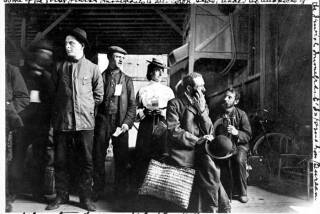Abraham D. Beame; Former N.Y. Mayor
- Share via
NEW YORK — Abraham D. Beame, the former accountant and city budget chief who in 1975 presided as mayor over New York City’s worst budget crisis, died Saturday in New York of complications of open heart surgery. He was 94.
Beame, who was New York’s first Jewish mayor, died at New York University Medical Center, where he had been hospitalized since July, said spokesman Howard Rubenstein.
Although he had been in poor health for several years, the longtime official tried to keep up a stream of public appearances, speaking out periodically on city issues.
Whenever possible, he defended himself against allegations that his administration had brought on the city’s financial woes, saying the seeds of those problems were sowed by Mayor John V. Lindsay, his predecessor. Lindsay died in December.
“I inherited a budget gap of $1.5 billion,” said Beame, who served as mayor from 1974 to 1978. “When I left, we had a surplus of $200 million.”
Others, however, said he shared a huge part of the blame for the problems.
“He was the last of the clubhouse mayors,” said former Mayor Edward I. Koch, who succeeded Beame. “He will be remembered for being the mayor when the city was in the middle of a fiscal crisis,” Koch told WINS radio.
The son of a restaurant owner, Beame was born in London in 1906 and was brought to the United States a year later. He graduated from City College with a degree in accounting. Beame opened an accounting firm and worked as a teacher in the city’s public schools before beginning a long career in municipal government.
A product of Democratic machine politics, he was assistant budget director, budget director and city comptroller before being elected New York’s 104th mayor in 1973.
Despite his extensive financial background, Beame could not avert a catastrophe at City Hall in 1975, when banks declined to buy any more city notes, citing a failure on New York’s part to provide proper information about real estate taxes that had not been collected.
65,000 City Jobs Cut as Bankruptcy Loomed
Critics said the city’s profligate spending habits and substandard accounting techniques had contributed to the escalating crisis.
As the controversy grew, the nation’s largest city was suddenly on the verge of bankruptcy. Beame was forced to cut 65,000 city jobs; he slashed salaries and capital expenditures.
Citing a financial emergency, he raised the city’s transit fare from 35 to 50 cents and imposed tuition for the first time on City College students.
Amid the political uproar, President Gerald R. Ford refused the city’s plea for emergency financial assistance, sparking the now-famous Daily News headline: “Ford to City: Drop Dead.”
New York ultimately staved off bankruptcy--and got a handle on its mountain of debt--by forming a complex partnership of state and city officials plus bank officials and union pension fund officers. By the time he left office in 1976, Beame had secured annual federal loans of $2.3 billion and insisted that he had been speaking out about the city’s slipshod accounting procedures for years before taking over City Hall. Still, he was forever linked in the public’s mind with the city’s darkest days.
A soft-spoken man who had virtually none of Lindsay’s charisma, Beame helped stage two events that signified New York’s comeback from the financial brink: the 1976 Democratic National Convention and a widely praised bicentennial celebration.
He was defeated, however, in the Democratic primary by Koch in 1977, finishing third.
He is survived by a son, Bernard, who managed his father’s 1973 mayoral campaign; a brother, Jack; five grandchildren; and two great-grandchildren. His wife, Mary, died in 1995 and his son Edmund died in June 1999.
More to Read
Sign up for Essential California
The most important California stories and recommendations in your inbox every morning.
You may occasionally receive promotional content from the Los Angeles Times.













